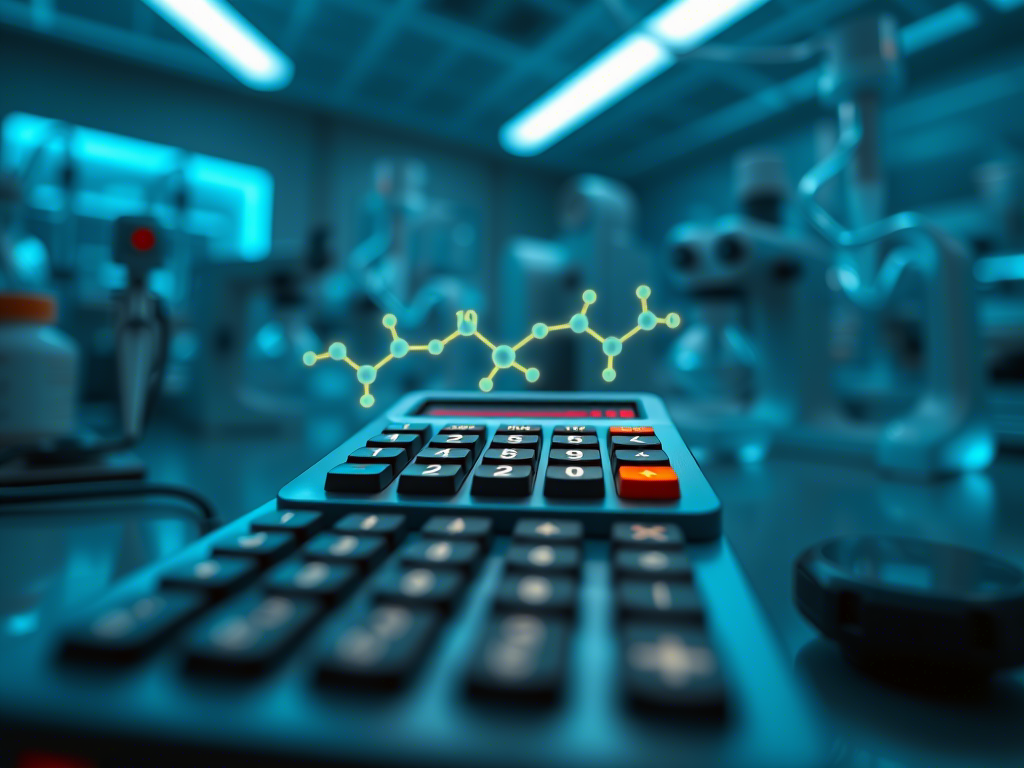In the world of research peptides, precision is paramount. Whether you’re a researcher, scientist, having access to a reliable peptide calculator can make the difference between accurate results and costly mistakes. This comprehensive guide will explore everything you need to know about peptide calculators, their applications, and how to use them effectively for precise measurements.

What is a Peptide Calculator?
A peptide calculator is an essential tool designed to simplify the complex process of calculating peptide dosages. These calculators help determine the correct amount of diluent (typically bacteriostatic water) needed to reconstitute lyophilized (freeze-dried) peptides and calculate the exact dosage based on your specific requirements.
Modern peptide calculator apps offer features that eliminate the guesswork from peptide reconstitution, ensuring you achieve the desired concentration every time. Whether you’re working with research peptides, therapeutic peptides, or diagnostic compounds, a peptide calculator streamlines the preparation process.
Types of Peptide Calculators Available
Peptide Reconstitution Calculator
The most common type of peptide calculator is the peptide reconstitution calculator. This tool helps determine the appropriate volume of bacteriostatic water to add to your lyophilized peptide to achieve your desired concentration. The best peptide reconstitution calculator will provide clear instructions on how much water to add and the resulting concentration.
Peptide Calculator Apps
For those who prefer mobile solutions, a peptide calculator app offers convenience on the go. These applications, available for both iOS and Android platforms, typically include features such as:
- Multiple syringe size options
- Conversion between measurement units (mg, mcg, IU)
- Ability to save previous calculations
- User-friendly interfaces for quick calculations
Many users consider the dedicated peptide calculator app superior to web-based calculators due to their accessibility without requiring an internet connection.
Specialized Peptide Calculators
For specific peptides, specialized calculators exist, such as:
- Peptide calculator semaglutide: Specifically designed for calculating semaglutide dosages, popular for research into metabolic conditions
- HCG peptide calculator: Tailored for human chorionic gonadotropin calculations, converting between IU and mg measurements
- Peptide calculator IU: Specialized for peptides measured in International Units rather than weight
- Free peptide calculator semaglutide: Offers specific calculations for semaglutide without subscription costs
Advanced Features in Modern Calculators
The peptide calculator beta versions being developed by leading providers often include advanced features such as:
- Multiple peptide combination calculations
- Automated adjustment suggestions based on peptide stability
- Integration with research databases
- Cloud synchronization across devices
How to Use a Peptide Calculator Effectively
Using a peptide calculator correctly is essential for accurate results. Here’s a step-by-step guide:
- Determine your peptide amount: Identify the quantity of peptide in your vial (typically in mg or IU)
- Select your diluent volume: Choose how much bacteriostatic water you’ll add
- Enter your desired dose: Specify the amount you want to administer
- Calculate: The calculator will determine the exact volume needed for your dose
For example, if you have a 5mg peptide vial and add 2ml of bacteriostatic water, each 0.1ml will contain 0.25mg of peptide. The calculator does this math for you automatically.
Common Questions About Peptide Calculators
How to Find Peptides?
Finding peptides for research purposes requires identifying reputable suppliers. Legitimate peptide sources typically:
- Provide certificates of analysis
- Offer detailed product information
- Maintain proper storage and shipping protocols
- Adhere to research-only designations
Many researchers source peptides from specialized research supply companies, university laboratories, or established biochemical suppliers. Always verify the legitimacy of any supplier before purchasing peptides for research purposes.

How Much Water to Mix with Peptides?
The amount of water to mix with peptides depends on your desired concentration. Typically, bacteriostatic water is used, and the volume can range from 1mL to 10mL depending on specific requirements.
A general guideline is to use:
- 1mL for a more concentrated solution
- 2mL for standard concentration
- 5mL or more for a more diluted solution
For example, adding 2mL of bacteriostatic water to a 5mg peptide vial creates a concentration of 2.5mg/mL. Your peptide calculator app can help you determine the optimal water volume based on your desired dosage.
How Much Peptide Do I Take?
The appropriate peptide dosage varies significantly depending on:
- The specific peptide being used
- Research protocols
- Individual factors
This is precisely why a peptide calculator is essential. For example, common research peptides like BPC-157 might be studied at dosages ranging from 200-500mcg per administration, while others may require different amounts.
Always use a peptide calculator to determine the exact volume needed to achieve your desired dosage based on your reconstitution concentration. The free peptide calculator semaglutide is particularly useful for those working with this specific peptide.
What is Peptide Count?
Peptide count refers to the number of different detected peptides derived from the same protein. In scientific contexts, especially proteomics research, peptide count is an important metric for protein identification and quantification.
In the context of peptide calculators, however, “peptide count” might refer to the number of peptides included in a calculation when working with multiple peptides simultaneously. Advanced peptide calculator beta versions often allow for calculations involving multiple peptides in a single solution.
Specialized Peptide Calculators
Peptide Calculator Semaglutide
Semaglutide has gained significant attention in metabolic research, leading to the development of specialized peptide calculator semaglutide tools. These calculators account for the specific properties of semaglutide and provide accurate dosing calculations.
When using a free peptide calculator semaglutide, you’ll typically need to:
- Enter the amount of semaglutide in your vial (typically 5mg or 10mg)
- Specify the volume of bacteriostatic water added
- Input your desired dose
- The calculator determines the exact volume needed
HCG Peptide Calculator
Human Chorionic Gonadotropin (HCG) is often measured in International Units (IU) rather than milligrams, making an HCG peptide calculator particularly useful. These specialized calculators convert between IU and volume measurements for precise administration.
For example, a 10,000 IU vial of HCG reconstituted with 10mL of bacteriostatic water yields 1,000 IU per mL. An HCG peptide calculator simplifies these conversions and helps determine exact dosing volumes.
Peptide Calculator IU
Many peptides, particularly hormone-based ones, are measured in International Units (IU) rather than weight. A peptide calculator IU is designed specifically for these compounds, converting between IU and volume measurements.
A good peptide calculator IU will allow you to:
- Enter the total IUs in your vial
- Specify the reconstitution volume
- Calculate the IUs per unit volume
- Determine the exact volume for your desired IU dose
The Best Peptide Reconstitution Calculator Features
When selecting the best peptide reconstitution calculator, look for these essential features:
- Multiple measurement units: Should support mg, mcg, IU conversions
- Various syringe options: Accommodates different syringe sizes (0.3mL, 0.5mL, 1mL)
- Reverse calculations: Allows you to determine concentration from dosage
- Multiple peptide support: Handles calculations for peptide combinations
- User-friendly interface: Provides clear, understandable results
- Storage capability: Saves previous calculations for reference
The best peptide reconstitution calculator will combine these features with accuracy and reliability.
Why the Peptide Calculator Beta Versions Offer Advanced Features
Many peptide calculator providers release peptide calculator beta versions to test new features before full release. These beta calculators often include:
- Enhanced user interfaces for simpler navigation
- Additional peptide presets for popular compounds
- More precise calculation algorithms
- Integration with research databases
- Compatibility with more devices
While beta versions may occasionally contain bugs, they often provide access to cutting-edge features that improve calculation accuracy and user experience.
Conclusion
A reliable peptide calculator is an indispensable tool for anyone working with peptides. Whether you prefer a dedicated peptide calculator app, a specialized peptide calculator semaglutide, or a versatile peptide calculator IU, these tools ensure precision in your peptide preparation.
By understanding how to properly use these calculators and following the guidelines for peptide reconstitution, you can achieve consistent, accurate results in your research or applications. Remember to always use bacteriostatic water for peptide reconstitution and follow proper storage protocols to maintain peptide integrity.
The advancement of peptide calculator beta versions and specialized calculators continues to improve the accessibility and accuracy of peptide preparations. As technology evolves, we can expect even more sophisticated calculators that further simplify the complex world of peptide dosing and administration.
Whether you’re searching for a free peptide calculator semaglutide or the best peptide reconstitution calculator, the right tool will make your peptide work more precise, efficient, and reliable.